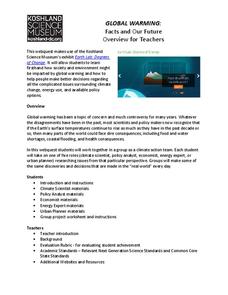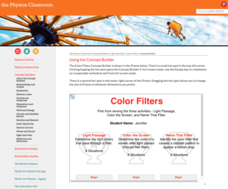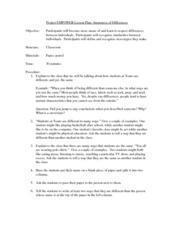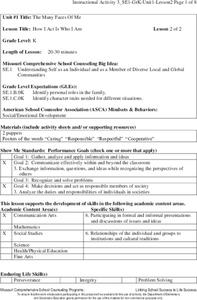National Academy of Sciences
Global Warming: Facts and Our Future
According to the United Nations, climate change affects every country on the planet. This research project encourages scholars to explore the factors that affect climate change from different perspectives: climate scientist, policy...
University of Minnesota
Blind Spot
Your eyes each work independently, so how do we only see one image? The quick hands-on experiment encourages young scientists to test their blind spots on each eye individually. After learning where the blind spot is and why it exists,...
Physics Classroom
Color Filters
Filters provide amusing changes to images in applications other than just Instagram! High school pupils apply their knowledge of colored filters to three different interactive sets of puzzles. They identify light colors that pass through...
PBS
Who, Me? Biased?: Understanding Implicit Bias
A 10-page interactive explains different facets of implicit bias, demonstrates how implicit bias works, and how people can counteract its effects. The interactive tools permit users to save their information in "My Work" folders, to take...
Curated OER
Good Apples
Young scholars examine how individual differences add to the value of our lives. They select an apple and tell a story to a partner about their apple and the distinguishing characteristics, discuss the significance of individual...
Curated OER
Project EMPOWER: Awareness of Differences
Students explore the differences of others. They examine ways in which they can respect the differences between individuals. Students explore the ways in which people are similar and they recognize stereotypes they make.
Curated OER
Valuing Our Differences
Students discuss the different components of culture. In this values lesson, students create a new language that their group must be able to speak. They share what they have learned from this experience.
Curated OER
Comparing Amount of Rainfall in Different Geographical Areas
Third graders create rain gauges and take them home. Individually, they record the rainfall amounts at all of their homes over a 2-week period and then bring the data back to class so they can compare the different amounts of rainfall...
Do2Learn
Respecting the Ideas of Others
Communicating clearly is one part of a successful conversation, but listening to others is just as important. Individuals with special needs plan calm responses and reactions to differing opinions with a collaborative activity.
Chicago Botanic Garden
Climate Change Around the World
You know climate change is happening when you see a bee take off its yellow jacket. Part four in a series of five lessons explores all factors affecting climate change: temperature, cloud cover, precipitation, and carbon dioxide. By...
Missouri Department of Elementary
How I Act Is Who I Am
A lesson plan centers itself around the topic of family roles. A whole-class discussion uses puppets and posters to go in-depth into the following character traits; caring, responsibility, respect, and cooperation. The discussion closes...
Missouri Department of Elementary
Celebrate Your Culture
After a class discussion about celebrations and customs, class members draw pictures depicting special events from their family cultures. Next, they draw pictures of an event from a different culture and share their work with classmates.
Missouri Department of Elementary
Listening Exercise
Active listening is key to interacting with others in a way that shows respect. To develop their skill as listeners, high schoolers first play the "Telephone Game" to demonstrate some of the problems that arise in communication. Pairs...
Chicago Botanic Garden
Recent Weather Patterns
Decide whether weather is changing! A two-part activity first challenges classes to review the differences between weather and climate. Once finished, individuals then analyze historical data to determine if climate change is happening...
EduGAINs
Discovery of Pi
Serve up a slice of math for Pi Day! A combination of fun, hands-on lessons and helpful worksheets encourage learners to practice finding the radius, diameter, and circumference of different circles.
English Enhanced Scope and Sequence
Differentiate between Formal and Informal Language
The Pledge of Allegiance, the Gettysburg Address, the National Anthem, and the Preamble to the Constitution all get close attention in an exercise that asks learners to rewrite these formally-worded documents into informal language....
Center for Learning in Action
Challenge with Solids, Liquids, and Gases
There's a container for every matter—liquid, solid, and gas. Pupils design three different containers, each with the capability to hold one of the states of matter, and share their design with the class.
National Institute of Open Schooling
Occurrence and Extraction of Metals
Steel is a man-made alloy or a mixture of metals. Lesson 18 in this series of 36 focuses on metals and their extraction from Earth. Individuals read about, discuss, and answer questions after learning how people find most metals, the...
Channel Islands Film
Santa Cruz Island - Visible Thinking Routines
Visible Thinking Routines are designed to help learners deepen their understanding of what they are learning and enable them to communicate their understanding of concepts to others. Individuals adopt one of these routines to use to...
Serendip
Soap Opera Genetics – Genetics to Resolve Family Arguments
Did she cheat on her husband? Did the hospital switch the babies? Should they have children? As much as this sounds like the plot for a soap opera, all of these questions fit into a single lesson on genetics. Scholars read about three...
Judicial Learning Center
The Judge and the Jury
Unless you are a lawyer, you might not understand just how unrealistic Law and Order and other legal dramas actually are. Here's a great resource to help scholars of criminology gain a more realistic perspective. The lesson outlines the...
American Museum of Natural History
Dive Into Worlds Within the Sea
Make connections between ocean organisms. Individuals explore three different ecosystems in the ocean. With an online interactive, they learn how different organisms depend upon each other. Learners first answer questions to connect...
American Museum of Natural History
What Do You Know About T. Rex?
There's so much to learn about dinosaurs. A 10-question quiz tests knowledge of the more detailed characteristics of the Tyrannosaurus Rex. As individuals complete the quiz, they better understand how fossil records helped define some of...
Learning to Give
Your Place in the Community
Learners identify their beliefs and values and compare how these values relate to those of their community. They then determine how their values affect the roles they play in different situations. A quiz about values and beliefs...

























